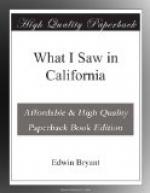We arrived at the rancho of Dr. Marsh about 5 o’clock P.M., greatly fatigued with the day’s ride. The residence of Dr. M. is romantically situated, near the foot of one of the most elevated mountains in the range separating the valley of the San Joaquin from the plain surrounding the Bay of San Francisco. It is called “Mount Diablo,” and may be seen in clear weather a great distance. The dwelling of Dr. M. is a small one-story house, rudely constructed of adobes, and divided into two or three apartments. The flooring is of earth, like the walls. A table or two, and some benches and a bed, are all the furniture it contains. Such are the privations to which those who settle in new countries must submit. Dr. M. is a native of New England, a graduate of Harvard University, and a gentleman of fine natural abilities and extensive scientific and literary acquirements. He emigrated to California some seven or eight years since, after having travelled through most of the Mexican States. He speaks the Spanish language fluently and correctly, and his accurate knowledge of Mexican institutions, laws, and customs was fully displayed in his conversation in regard to them. He obtained the grant of land upon which he now resides, some ten or twelve miles square, four or fire years ago; and although he has been constantly harassed by the wild Indians, who have several times stolen all his horses, and sometimes numbers of his cattle, he has succeeded in permanently establishing himself. The present number of cattle on his rancho is about two thousand, and the increase of the present year he estimates at five hundred.
I noticed near the house a vegetable garden, with the usual variety of vegetables. In another inclosure was the commencement of an extensive vineyard, the fruit of which (now ripe) exceeds in delicacy of flavour any grapes which I have ever tasted. This grape is not indigenous, but was introduced by the padres, when they first established themselves in the country. The soil and climate of California have probably improved it. Many of the clusters are eight and ten inches in length, and weigh several pounds. The fruit is of medium size, and in colour a dark purple. The rind is very thin, and when broken the pulp dissolves in the mouth immediately. Although Dr. M. has just commenced his vineyard, he has made several casks of wine this year, which is now in a stale of fermentation. I tasted here, for the first time, aguardiente, or brandy distilled from the Californian grape. Its flavour is not unpleasant, and age, I do not doubt, would render it equal to the brandies of France. Large quantities of wine and aguardiente are made from the extensive vineyards farther south. Dr. M. informed me that his lands had produced a hundredfold of wheat without irrigation. This yield seems almost incredible; but, if we can believe the statements of men of unimpeached veracity, there have been numerous instances of reproduction of wheat in California equalling and even exceeding this.




